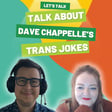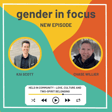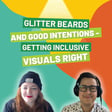
Trans Lives: Not New, Not a Trend, Not Going Anywhere
What happens when the simple act of being yourself is dismissed as a “trend”?
In this episode, we explore the profound impact of visibility for trans people - how seeing your own experiences reflected in the world offers not just affirmation, but a deep sense of recognition and belonging. Yet when that reality is brushed aside as a passing fad, the harm runs deep, especially for trans youth who are still finding their way.
We look at the growing wave of trans erasure unfolding around the world - from attacks on rights to the systematic removal of scientific research and historical records - and how these acts of deliberate forgetting distort our collective understanding of trans lives, erasing a history that has always existed.
Join us for this important conversation as we push back against harmful myths and offer an important reminder: trans lives are not new, not a trend, and absolutely not going anywhere.
___________
Want to get in touch? Contact us at podcast@transfocus.ca
Join us on social media:
LinkedIn | Instagram | TikTok | Threads | Facebook



















